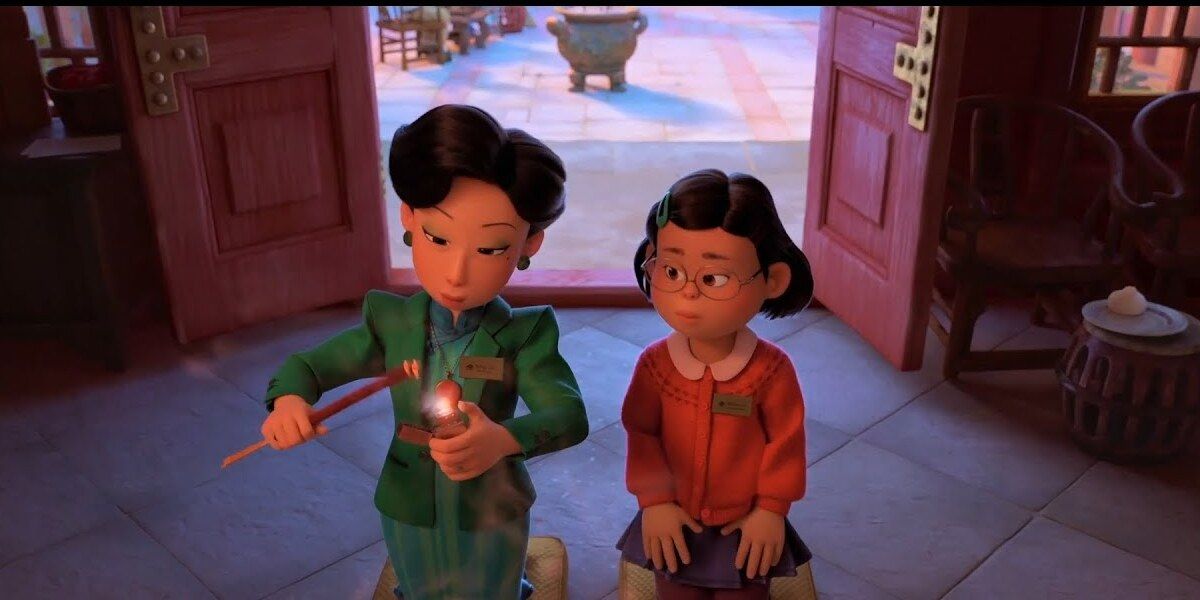WARNING: The following contains spoilers for Pixar's Turning Red, now streaming on Disney+.
Pixar's Turning Red launched on Disney+, and the film shares a lot in common with Disney's Encanto. Many fans of the movies have noticed the shared theme of perfectionism. Both stories focus on younger female characters coming to grips with the stringent expectations of their families. However, the protagonist's reaction to the pressure is very different in Turning Red.
Many in the audience can relate to the girls' plight, and it's nice to see both studios covering the unfortunately common issue. In addition to the fact that Mirabel isn't magical and Mei can turn into a giant red panda, the significant difference between the films is how the girls resolve the tension with their mothers and grandmothers.
Encanto & Turning Red Both Struggle With Toxic Matriarchs
In Encanto, Mirabel is the youngest of three sisters and lives with a large extended family. It's quickly revealed that she's the only Madrigal who hasn't received a gift. Without powers, Mirabel often feels like she doesn't belong in her family. Her Abuela's painful remarks frequently reinforce that doubt.
Abuela Alma Madrigal cuts down Mirabel throughout the movie's beginning by insisting that she can't help as the rest of the family can. When Mirabel is simply trying to provide a heartfelt decoration for the upcoming gift ceremony for Antonio, Abuela suggests that she leave the decor to someone else. Moreover, as Mirabel stares at photos of her family in front of their magical doors with Abuela, audiences can see that Mirabel doesn't get a picture. Worst of all, when Mirabel is concerned over the cracks and Abuela can't see them, her grandmother dismisses her in front of the entire town. Ouch.
Turning Red also deals with an overbearing matriarch in Mei's mother and grandmother. When this film starts, audiences see Mei talking about being her own person and making her own choices. But within a few moments, Mei has to rush back to the family temple because "it's not all about me." She has responsibilities, and some of her "moves" are her mom's. While it's not uncommon to see a portrayal of the strictness of Asian families, Turning Red does it beautifully while still being authentic.
Frequently, fans see Mei's mom, Ming, speak badly about her friends, whose love holds the key to controlling her red panda form, and step over her choices and words -- to the point that Mei's mother humiliates her in front of a cute boy. It's not just Mei either. Ming treats her husband this way too. Of course, fans see exactly where Mrs. Lee gets it from, her mother, who's potentially even scarier than Ming.
Encanto's Mirabel Gently Pushes Back Against Her Abuela
When Encanto's familial tension comes to a head, Mirabel does stand up to her Abuela. However, she does so calmly and is more sad than upset. Throughout the story, Mirabel realizes that her powered sisters and cousins feel the pressure of Abuela's unwavering gaze too. They also don't think they can ever live up to her expectations. Bruno even left the family rather than stand up to his mom.
At the emotional climax, Abuela screams at Mirabel that she's hurting the family. Instead of responding in kind, Mirabel stays mainly controlled and even risks her life to save the candle. When it looks like all is lost, Mirabel leaves the Encanto because somehow, she still thinks everything is her fault.
In the end, Abuela finds Mirabel to set things right. Mirabel's words do change her grandmother's heart, and they can come together when Abuela is finally honest with herself about how she closed herself off out of fear. Audiences see the origin of the pressure that each family member has felt, and it's healed at the source.
Mei Pulls No Punches in Turning Red
In contrast, Turning Red's Mei is an only child who struggles to be the honor student daughter her mother expects. Everything is, of course, made so much worse when Mei suddenly turns into a red panda and must learn to control her power. Mei hits a turning point when her mom doesn't let her go to a concert even though she's proven she can be responsible. In a remarkably candid line, Mei says, "if they don't trust us anyway, then what's the point?"
The moment marks Mei's first major act of rebellion, but it certainly doesn't stop there. When it comes time for the ritual to seal her panda away, Mei shakes out of the trance and defies her family by keeping her red side alive. Mei embraces her wild, beast-like qualities and literally fights against her mother, whose own panda has gotten out and is 100 feet tall, no less. Luckily, her mother also learns to accept her, and even the relationship between grandmother and mother improves.
While Encanto focuses on coming to accept oneself, it's from a later period in life. Turning Red showcases the classic coming-of-age dilemma of branching out from one's parents. The best thing about both is how the young women stand up for themselves and the spotlight they shine on the destructive effects of trying to be "perfect."
To see Mei stand up to her mom, watch Turning Red on Disney+ now.




